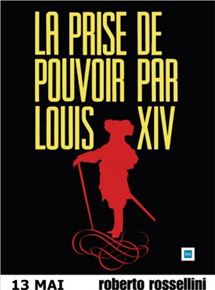
Louis XIV, also known as Louis the Great or the Sun King, was King of France from 1643 until his death in 1715. His verified reign of 72 years and 110 days is the longest of any sovereign. Although Louis XIV's France was emblematic of the Age of Absolutism in Europe, the King surrounded himself with a variety of significant political, military, and cultural figures, such as Bossuet, Colbert, Louvois, Le Brun, Le Nôtre, Lully, Mazarin, Molière, Racine, Turenne, Condé, and Vauban.

McCabe & Mrs. Miller is a 1971 American revisionist Western film directed by Robert Altman and starring Warren Beatty and Julie Christie. The screenplay by Altman and Brian McKay is based on the 1959 novel McCabe by Edmund Naughton. Altman referred to it as an "anti-Western" film because it ignores or subverts a number of Western conventions. It was filmed in British Columbia, Canada in the fall and winter of 1970, and premiered on June 24, 1971.
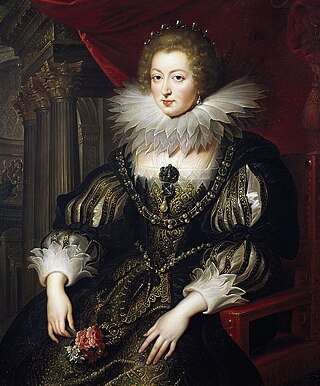
Anne of Austria was an infanta of Spain who became Queen of France as the wife of King Louis XIII from their marriage in 1615 until Louis XIII died in 1643. She was also Queen of Navarre until that kingdom was annexed into the French crown in 1620. After her husband's death, Anne was regent to her son Louis XIV, during his minority, until 1651. During her regency, Cardinal Mazarin served as France's chief minister. Accounts of French court life of Anne's era emphasize her difficult marital relations with her husband, her closeness to her son, and her disapproval of her son's marital infidelity to her niece and daughter-in-law Maria Theresa.

Armand Jean du Plessis, 1st Duke of Richelieu, known as Cardinal Richelieu, was a French statesman and clergyman. He became known as l'Éminence rouge, or "the Red Eminence", a term derived from the title "Eminence" applied to cardinals and from the red robes that they customarily wear.
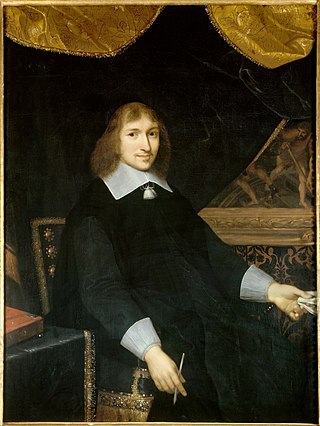
Nicolas Fouquet, marquis de Belle-Île, vicomte de Melun et Vaux was the Superintendent of Finances in France from 1653 until 1661 under King Louis XIV. He had a glittering career, and acquired enormous wealth. He fell out of favor, accused of peculation and lèse-majesté. The king had him imprisoned from 1661 until his death in 1680.

Jean-Baptiste Colbert was a French statesman who served as First Minister of State from 1661 until his death in 1683 under the rule of King Louis XIV. His lasting impact on the organization of the country's politics and markets, known as Colbertism, a doctrine often characterized as a variant of mercantilism, earned him the nickname le Grand Colbert.
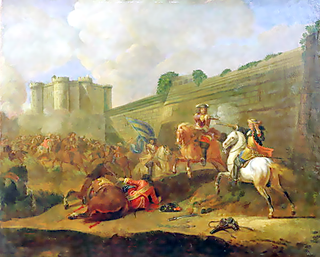
The Fronde was a series of civil wars in the Kingdom of France between 1648 and 1653, occurring in the midst of the Franco-Spanish War, which had begun in 1635. The government of the young King Louis XIV confronted the combined opposition of the princes, the nobility, the law courts (parlements), as well as much of the French population, and managed to subdue them all. The dispute started when the government of France issued seven fiscal edicts, six of which were to increase taxation. The parlements resisted, questioned the constitutionality of the king's actions, and sought to check his powers.

Jules Cardinal Mazarin, born Giulio Raimondo Mazzarino or Mazarini, was an Italian cardinal, diplomat and politician who served as the chief minister to the Kings of France Louis XIII and Louis XIV from 1642 to his death. In 1654, he acquired the title Duke of Mayenne and in 1659 that of 1st Duke of Rethel and Nevers.
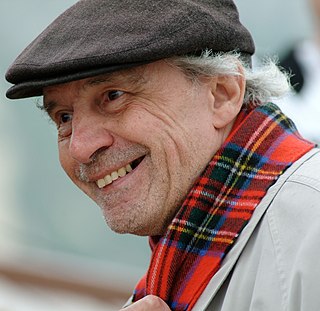
Jacques Rivette was a French film director and film critic most commonly associated with the French New Wave and the film magazine Cahiers du Cinéma. He made twenty-nine films, including L'Amour fou (1969), Out 1 (1971), Celine and Julie Go Boating (1974), and La Belle Noiseuse (1991). His work is noted for its improvisation, loose narratives, and lengthy running times.
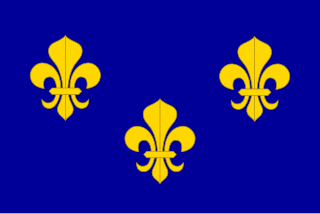
The Kingdom of France in the early modern period, from the Renaissance to the Revolution (1789–1804), was a monarchy ruled by the House of Bourbon. This corresponds to the so-called Ancien Régime. The territory of France during this period increased until it included essentially the extent of the modern country, and it also included the territories of the first French colonial empire overseas.

The Kingdom of France is the historiographical name or umbrella term given to various political entities of France in the medieval and early modern period. It was one of the most powerful states in Europe since the High Middle Ages. It was also an early colonial power, with colonies in Asia and Africa, and the largest being New France in North America.
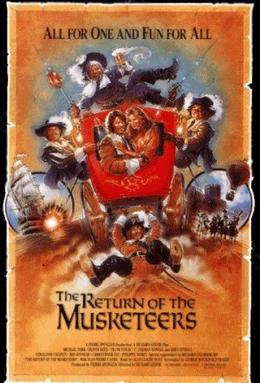
The Return of the Musketeers is a 1989 film adaptation loosely based on the novel Twenty Years After (1845) by Alexandre Dumas. It is the third Musketeers film directed by Richard Lester, following 1973's The Three Musketeers and 1974's The Four Musketeers. Like the other two films, the screenplay was written by George MacDonald Fraser.

A favourite was the intimate companion of a ruler or other important person. In post-classical and early-modern Europe, among other times and places, the term was used of individuals delegated significant political power by a ruler. It was especially a phenomenon of the 16th and 17th centuries, when government had become too complex for many hereditary rulers with no great interest in or talent for it, and political institutions were still evolving. From 1600 to 1660 there were particular successions of all-powerful minister-favourites in much of Europe, particularly in Spain, England, France and Sweden.

The Man in the Iron Mask is a 1977 television film loosely adapted from the 1847–1850 novel The Vicomte de Bragelonne by Alexandre Dumas and presenting several plot similarities with the 1939 film version. It was produced by Norman Rosemont for ITC Entertainment, and starred Richard Chamberlain as King Louis XIV and his twin Philippe, Patrick McGoohan as Nicolas Fouquet, Ralph Richardson as Jean-Baptiste Colbert, Louis Jourdan as D'Artagnan, and Ian Holm as the Chevalier Duval. Jenny Agutter plays Louis XIV's mistress, Louise de la Vallière. Vivien Merchant appears as Queen Marie-Therese. It was directed by Mike Newell.
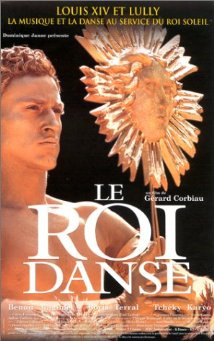
The King is Dancing is a 2000 costume drama by Belgian filmmaker Gérard Corbiau based on Philippe Beaussant's biography of Jean-Baptiste Lully, Lully ou le musicien du soleil (1992). The film, presenting libertine and pagan Lully as a natural ally of the early Enlightenment figure Louis XIV of France in his conflicts with the Catholic establishment, focuses on Lully's personal relationship with the King, as well as his camaraderie with Molière and rivalry with Robert Cambert.

Philippe Jules Mancini, 8th Duke of Nevers (1641–1707) was the nephew of Cardinal Mazarin, chief minister of France immediately after the death of King Louis XIII. He was the brother of the five famous Mancini sisters, who, along with two of their female Martinozzi cousins, were known at the court of King Louis XIV of France as the Mazarinettes.
La Reine et le Cardinal is a 2009 French television film directed by Marc Rivière and starring Alessandra Martines and Philippe Torreton in the title roles. It is based on events in the early years of the reign of Louis XIV of France. The drama of the rumored love affair between the child king's widowed mother, Anne of Austria, and her prime minister, Cardinal Mazarin, unfolds as intrigue and political discord ignite the Fronde. The second part of the film covers the romance between Louis XIV and Mazarin's niece, Marie Mancini and ends with the death of Mazarin. Broadcast in two parts, it lasts over three hours. Marc Rivière won a best director awards at the La Rochelle TV festival

In the early modern France, Orientalism refers to the interaction of pre-modern France with the Orient, and especially the cultural, scientific, artistic and intellectual impact of these interactions, ranging from the academic field of Oriental studies to Orientalism in fashions in the decorative arts.

The Ballet Royal de la Nuit, Ballet Royal de la Nuict in its original spelling and often referred to simply as the Ballet de la Nuit, is a ballet de cour with a libretto by Isaac de Benserade and music by Jean de Cambefort, Jean-Baptiste Boësset, Michel Lambert and possibly others, which premiered on February 23, 1653, at the Salle du Petit-Bourbon in Paris. It took 13 hours to perform and included the debut of the fourteen-year-old Louis XIV as Apollo, the Sun King.

The Count of Bragelonne is a 1954 Franco-Italian film directed by Fernando Cerchio. It is a film adaptation of the novel Le Vicomte de Bragelonne by Alexandre Dumas père. Its cast included Dawn Addams, Georges Marchal and Jacques Dumesnil. It was shot at the Billancourt Studios in Paris. The film's sets were designed by the art director Roland Quignon.
